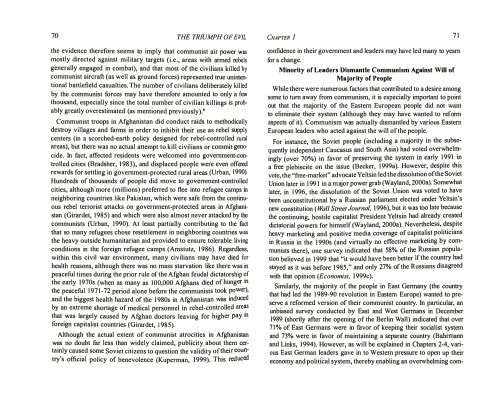austin-murphy-the-triumph-of-evil
austin-murphy-the-triumph-of-evil
austin-murphy-the-triumph-of-evil
Create successful ePaper yourself
Turn your PDF publications into a flip-book with our unique Google optimized e-Paper software.
70 THE TRIUMPH OF EVIL<br />
<strong>the</strong> evidence <strong>the</strong>refore seems to imply that communist air power was<br />
mostly directed against military targets (i.e., areas with armed rebels<br />
generally engaged in combat), and that most <strong>of</strong> <strong>the</strong> civilians killed by<br />
communist aircraft (as well as ground forces) represented true uninten<br />
tional battlefield casualties. The nwnber <strong>of</strong> civilians deliberately killed<br />
by <strong>the</strong> communist fo rces may have <strong>the</strong>refore amounted to only a few<br />
thousand, especially since <strong>the</strong> total number <strong>of</strong> civilian killings is prob<br />
ably greatly overestimated (as mentioned previously}.6<br />
Communist troops in Afghanistan did conduct raids to methodically<br />
destroy villages and farms in order to inhibit <strong>the</strong>ir use as rebel supply<br />
centers (in a scorched-earth policy designed for rebel-controlled rural<br />
areas), but <strong>the</strong>re was no actual attempt to kill civilians or commit geno<br />
cide. In fact, affected residents were welcomed into government-con<br />
trolled cities (Bradsher, 1983}, and displaced people were even <strong>of</strong>fered<br />
rewards for settling in government-protected rural areas (Urban, 1990).<br />
Hundreds <strong>of</strong> thousands <strong>of</strong> people did move to government-controlled<br />
cities, although more (millions) preferred to flee into refugee camps in<br />
neighboring countries like Pakistan, which were safe from <strong>the</strong> continu<br />
ous rebel terrorist attacks on government-protected areas in Afghani·<br />
stan (Girardet, 1985) and which were also almost never attacked by <strong>the</strong><br />
communists (Urban, 1990). At least partially contributing to <strong>the</strong> fact<br />
that so many refugees chos.e resettlement in neighboring countries was<br />
<strong>the</strong> heavy outside humanitarian aid provided to ensure tolerable living<br />
conditions in <strong>the</strong> foreign refugee camps (Amstutz, 1986). Regardless,<br />
within this civil war environment, many civilians may have died f�r<br />
health reasons, although <strong>the</strong>re was no mass starvation like <strong>the</strong>re was tn<br />
peaceful times during <strong>the</strong> prior rule <strong>of</strong> <strong>the</strong> Afghan feudal dictatorship �f<br />
<strong>the</strong> early 1970s (when as many as 100,000 Afghans died <strong>of</strong> hunger tn<br />
<strong>the</strong> peaceful 1971-72 period alone before <strong>the</strong> communists took power),<br />
and <strong>the</strong> biggest health hazard <strong>of</strong> <strong>the</strong> 1980s in Afghanistan was induced<br />
by an extreme shortage <strong>of</strong> medical personnel in rebel-controlled are�<br />
that was largely caused by Afghan doctors leaving for higher pay tn<br />
fo reign capitalist countries (Girardet, 1985).<br />
Although <strong>the</strong> actual extent <strong>of</strong> communist atrocities in Afghanistan<br />
was no doubt far less than widely claimed, publicity about <strong>the</strong>m cer·<br />
tainly caused some Soviet citizens to question <strong>the</strong> validity <strong>of</strong> <strong>the</strong>ir coun<br />
try's <strong>of</strong>ficial policy <strong>of</strong> benevolence (Kuperman, 1999). This reduced<br />
CHAPTER 1<br />
confidence in <strong>the</strong>ir government and leaders may have led many to yearn<br />
for a change.<br />
Minority <strong>of</strong> Leaders Dismantle Communism Against Will <strong>of</strong><br />
Majority <strong>of</strong> People<br />
While <strong>the</strong>re were numerous factors that contributed to a desire among<br />
some to tum away from communism, it is especially important to point<br />
out that <strong>the</strong> majority <strong>of</strong> <strong>the</strong> Eastern European people did not want<br />
to eliminate <strong>the</strong>ir system (although <strong>the</strong>y may have wanted to reform<br />
aspects <strong>of</strong> it). Communism was actually dismantled by various Eastern<br />
European leaders who acted against <strong>the</strong> will <strong>of</strong> <strong>the</strong> people.<br />
For instance, <strong>the</strong> Soviet people (including a majority in <strong>the</strong> subse<br />
quently independent Caucasus and South Asia) had v�ted overwhe�<br />
ingly (over 70%) in favor <strong>of</strong> preserving <strong>the</strong> system m early 1 . 991 '_I1<br />
a free plebiscite on <strong>the</strong> issue (Becker, 1999a). However, desptte t�1s<br />
vote, <strong>the</strong> "free-market" advocate Yeltsin led <strong>the</strong> dissolution <strong>of</strong> <strong>the</strong> Sovtet<br />
Union later in 1991 in a major power grab (Wayland, 2000a). Somewhat<br />
later in 1996 <strong>the</strong> dissolution <strong>of</strong> <strong>the</strong> Soviet Union was voted to have<br />
bee� unconstitutional by a Russian parliament elected under Ye ltsin 's<br />
new constitution (Wall Street Journal, 1996), but it was too late because<br />
<strong>the</strong> continuing, hostile capitalist President Yeltsin had already creat � d<br />
dictatorial powers for himself (Wayland, 2000a). Nev�rth . eless, ��s�tte<br />
heavy marketing and positive media coverage <strong>of</strong> capttalist polihctans<br />
in Russia in <strong>the</strong> 1990s (and virtually no effective marketi�g by com<br />
munists <strong>the</strong>re), one survey indicated that 58% <strong>of</strong> th� Russtan popula<br />
tion believed in 1999 that "it would have been better tf <strong>the</strong> country had<br />
stayed as it was before 1985," and only 27% <strong>of</strong> <strong>the</strong> Russians disagreed<br />
with that opinion (Economist, 1999c ).<br />
Similarly, <strong>the</strong> majority <strong>of</strong> <strong>the</strong> people in East Germany (<strong>the</strong> country<br />
that had led <strong>the</strong> 1989-90 revolution in Eastern Europe) wanted to pre<br />
serve a reformed version <strong>of</strong> <strong>the</strong>ir communist country. In particular, an<br />
unbiased survey conducted by East and West Ge � a � s in December<br />
1989 (shortly after <strong>the</strong> opening <strong>of</strong> <strong>the</strong> Berlin Wall} 1 � d1ca�� that over<br />
71% <strong>of</strong> East Germans were in favor <strong>of</strong> keeping <strong>the</strong>rr soctahst system<br />
and 73% were in favor <strong>of</strong> maintaining a separate country (Bahrrna�<br />
and Links, 1994). However, as will be explained in Chapters 2-4, va � <br />
ous East German leaders gave in to Western pressure to open . up <strong>the</strong>tr<br />
economy and political system, <strong>the</strong>reby enabling an overwhelmmg com-<br />
71


